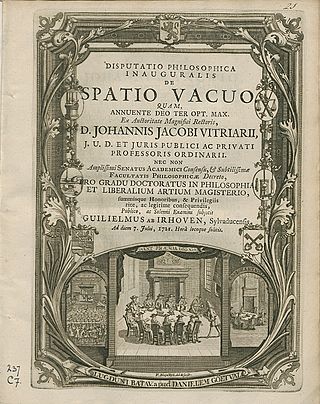
Gymnasium is a term in various European languages for a secondary school that prepares students for higher education at a university. It is comparable to the US English term preparatory high school or the British term grammar school. Before the 20th century, the gymnasium system was a widespread feature of educational systems throughout many European countries.

Matura or its translated terms is a Latin name for the secondary school exit exam or "maturity diploma" in various European countries, including Albania, Austria, Bosnia and Herzegovina, Bulgaria, Croatia, Czech Republic, Hungary, Italy, Kosovo, Liechtenstein, Montenegro, North Macedonia, Poland, Serbia, Slovakia, Slovenia, Switzerland and Ukraine.

A thesis, or dissertation, is a document submitted in support of candidature for an academic degree or professional qualification presenting the author's research and findings. In some contexts, the word thesis or a cognate is used for part of a bachelor's or master's course, while dissertation is normally applied to a doctorate. This is the typical arrangement in American English. In other contexts, such as within most institutions of the United Kingdom and Republic of Ireland, the reverse is true. The term graduate thesis is sometimes used to refer to both master's theses and doctoral dissertations.

Matriculation is the formal process of entering a university, or of becoming eligible to enter by fulfilling certain academic requirements such as a matriculation examination.
The term summer vacation or summer break refers to a school break in the summer between school years and the break in the school academic year. Students are off anywhere between two weeks to three and a half months. Depending on the country and district, staff might be partially or fully excluded.

In higher education, a comprehensive examination, often abbreviated as "comps", is a specific type of examination that must be completed by graduate students in some disciplines and courses of study, and also by undergraduate students in some institutions and departments. Unlike final examinations, comprehensive examinations are not linked to any particular course, but rather test knowledge across one or more general fields of study.

Te'udat Bagrut is a certificate that attests that a student has successfully passed Israel's high school matriculation examination. Bagrut is a prerequisite for higher education in Israel.
In India, board examinations refer to the public examinations that are conducted at the completion of secondary and senior secondary education.
An admission to practice law is acquired when a lawyer receives a license to practice law. In jurisdictions with two types of lawyer, as with barristers and solicitors, barristers must gain admission to the bar whereas for solicitors there are distinct practising certificates.
English is the only compulsory subject for the award of the Higher School Certificate at the end of secondary schooling in New South Wales, Australia. Marks gained in at least two units of English must also be included in the calculation of the Australian Tertiary Admission Rank (ATAR) used to determine entry to university. Students must study one of the following courses:
Higher Secondary Certificate (HSC), Higher Secondary School Certificate (HSSC) or Higher Secondary Education Certificate (HSEC) is a secondary education qualification in Bangladesh, India and Pakistan. It is equivalent to the final year of high school in the United States and GCSE and/or A level in the United Kingdom.

An academic certificate or tech certificate is a document that certifies that a person has received specific education or has passed a test or series of tests.

The O-Level is a subject-based qualification conferred as part of the General Certificate of Education. It began in the United Kingdom and has been adopted, often with modifications, in several other countries.
In the education system of the Czech Republic, the Student Chamber of the Council of Higher Education Institutions, together with the Czech Rectors Conference, forms the official representation of Czech Higher Education Institutes (HEIs), on the basis of the Higher Education Act of the Czech Republic, Article 92.
The oral exam is a practice in many schools and disciplines in which an examiner poses questions to the student in spoken form. The student has to answer the question in such a way as to demonstrate sufficient knowledge of the subject to pass the exam. The oral exam also helps reduce the risk of granting a degree to a candidate who has had the thesis or dissertation ghostwritten by an expert.
Alternative pathways in education are alternative means of obtaining educational qualifications, other than the traditional means of gaining access to or completing the required study to obtain the educational qualifications.
A high school diploma or high school degree is a diploma awarded upon graduation of high school. A high school diploma is awarded after completion of courses of studies lasting four years, typically from grade 9 to grade 12. It is the school leaving qualification in the United States and Canada.
In the United States, the PhD degree is the highest academic degree awarded by universities in most fields of study. American students typically undergo a series of three phases in the course of their work toward the PhD degree. The first phase consists of coursework in the student's field of study and requires one to three years to complete. This often is followed by a preliminary, a comprehensive examination, or a series of cumulative examinations where the emphasis is on breadth rather than depth of knowledge. The student is often later required to pass oral and written examinations in the field of specialization within the discipline, and here, depth is emphasized. After the comprehensive examination the student is a "PhD Candidate", which is the academic equivalent of a master's degree. Some universities will award terminal Master's for students who drop out of the PhD program at this stage, and some, like Columbia University and the Albert Einstein College of Medicine, award a Master's en route to the PhD. Some PhD programs require the candidate to successfully complete requirements in pedagogy or applied science.
The Junior Cycle is the first stage of the education programme for post-primary education within the Republic of Ireland. It is overseen by the Department of Education and the National Council for Curriculum and Assessment (NCCA), and its terminal examination, the Junior Certificate, by the State Examinations Commission.







